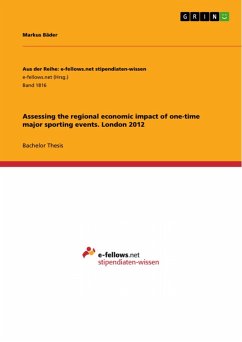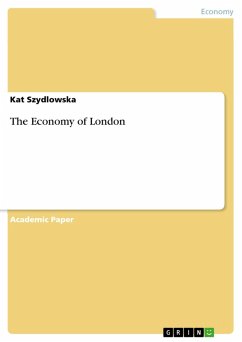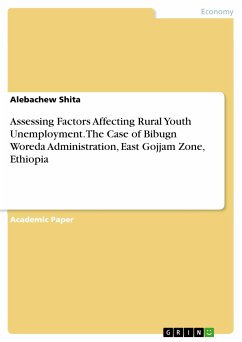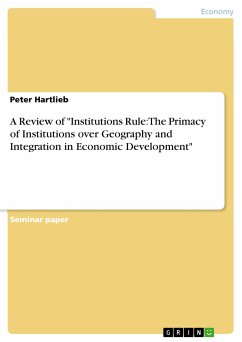Bachelor Thesis from the year 2015 in the subject Business economics - Economic Policy, grade: 1.0, Northumbria University (Newcastle Business School), course: Final Thesis, language: English, abstract: The main objective of this study was to examine the existing economic impact studies on London 2012 after understanding the shortcomings of traditional methods and exploring advanced approaches. In a first step this work has therefore focused on basic economic frameworks, namely Leontief's IOA and the CBA, which have long been used in the event impact evaluations (Levy & Berger, 2013; Preuss, 2004a). Despite their straightforward application, both models reveal significant shortcomings, including the exaggeration of impacts and inability to address opportunity costs (IOA, cf. Lahr & Stevens, 2002) or specific economic situations (CBA, cf. Késenne, 2005). As most of the weaknesses can be traced back to the use of economic multipliers (Preuss, 2004a), this study examined adjustments to the traditional models in a second step. Despite a more complicated realisation and its origin in US-specific data the, RIMSII and IMPLAN models, if at all, reduce the negative multiplier effects (Lynch, 2000; Rickman & Schwer, 1995). On this account, the GCE approach emerged and has been hailed a panacea by a number of event-assessing authors (Dwyer et al., 2004, 2006; Partridge & Rickman, 2010), notwithstanding the fact that the approach still fails to reduce the degree of subjectivity in the evaluation (Kasimati & Dawson, 2009). In a third step, the valuation method of Preuss (2004a, 2004b) has been introduced since its different approach to regionalise the primary impact best fits this studies' objective to present a model that assesses the regional impact of the Olympics. Concluding with a review of five London 2012 studies, this work reveals that several attempts have been made to assess the economic consequences of the event on the British capital. Although a variety of models, including CGE (Blake, 2005), CBA (ARUP, 2002) and IOA (Oxford Economics, 2012), has been employed, it is the author's belief that the literature still lacks a sufficient investigation on the city's regional impact.
Dieser Download kann aus rechtlichen Gründen nur mit Rechnungsadresse in A, B, BG, CY, CZ, D, DK, EW, E, FIN, F, GR, HR, H, IRL, I, LT, L, LR, M, NL, PL, P, R, S, SLO, SK ausgeliefert werden.









